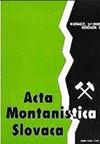The Impact of Selected Material Flows on the Development of OECD Countries Located in Europe
IF 1.4
4区 地球科学
Q2 GEOSCIENCES, MULTIDISCIPLINARY
引用次数: 1
Abstract
Mining and processing of raw materials are at the beginning of all industrial value chains. As global demand for raw materials grows, basic raw materials will continue to play a key role. Global value chains have become a dominant feature of world trade. The process of production of goods from raw materials to the finished product, intended for the final consumer, is carried out primarily where the necessary professional and material prerequisites are available, at competitive costs and quality. Although the EU has a long tradition of mining and processing raw materials, as well as rich reserves of aggregates and non-metallic minerals, some metals such as copper and zinc, but also some critical raw materials. However, their use is not optimal for various reasons, such as insufficient investment in geological exploration and extraction, diverse and lengthy national permitting procedures, or low public acceptance. Shortcomings in the EU's mining, processing, recycling, refining and unbundling capacity (e.g. in the case of lithium or rare earths) reflect a lack of resilience and high dependence on supplies from other parts of the world. At the same time, the crisis caused by the COVID-19 pandemic may have an impact on the further direction of industrial policy with an effort to increase diversification and regionalization of production processes, resp. gaining economic sovereignty in strategic areas. Raw materials form the basis of the European economy in order to secure jobs and competitiveness and are essential for maintaining and improving our quality of life. Ensuring reliable, sustainable and unhindered access to and circulation of raw materials in the economy is therefore a growing concern within the EU, not only regionally but also globally. It is for these reasons that it is necessary to examine the consumption of materials in relation to the stage of development of countries.选定的物质流对位于欧洲的经合组织国家发展的影响
原材料的开采和加工是所有产业价值链的起点。随着全球原材料需求的增长,基础原材料将继续发挥关键作用。全球价值链已成为世界贸易的主导特征。从原材料到最终消费者的成品的生产过程,主要是在具备必要的专业和材料先决条件的情况下进行的,成本和质量具有竞争力。虽然欧盟有着悠久的开采和加工原材料的传统,以及丰富的骨料和非金属矿物储量,一些金属如铜和锌,也是一些关键的原材料。然而,由于各种原因,如地质勘探和开采投资不足,国家许可程序多样而漫长,或公众接受程度低,它们的使用并不是最佳的。欧盟在采矿、加工、回收、精炼和拆解能力(例如锂或稀土)方面的不足反映出其缺乏弹性和对世界其他地区供应的高度依赖。与此同时,2019冠状病毒病大流行造成的危机可能会对产业政策的进一步方向产生影响,包括努力加强生产过程的多样化和区域化。在战略地区获得经济主权。原材料构成了欧洲经济的基础,以确保就业和竞争力,对维持和提高我们的生活质量至关重要。因此,确保经济中原材料的可靠、可持续和畅通无阻的获取和流通,不仅在区域内,而且在全球范围内,都是欧盟日益关注的问题。正是由于这些原因,有必要研究与各国发展阶段有关的材料消费。
本文章由计算机程序翻译,如有差异,请以英文原文为准。
求助全文
约1分钟内获得全文
求助全文
来源期刊

Acta Montanistica Slovaca
地学-地球科学综合
CiteScore
3.60
自引率
12.50%
发文量
60
审稿时长
30 weeks
期刊介绍:
Acta Montanistica Slovaca publishes high quality articles on basic and applied research in the following fields:
geology and geological survey;
mining;
Earth resources;
underground engineering and geotechnics;
mining mechanization, mining transport, deep hole drilling;
ecotechnology and mineralurgy;
process control, automation and applied informatics in raw materials extraction, utilization and processing;
other similar fields.
Acta Montanistica Slovaca is the only scientific journal of this kind in Central, Eastern and South Eastern Europe.
The submitted manuscripts should contribute significantly to the international literature, even if the focus can be regional. Manuscripts should cite the extant and relevant international literature, should clearly state what the wider contribution is (e.g. a novel discovery, application of a new technique or methodology, application of an existing methodology to a new problem), and should discuss the importance of the work in the international context.
 求助内容:
求助内容: 应助结果提醒方式:
应助结果提醒方式:


